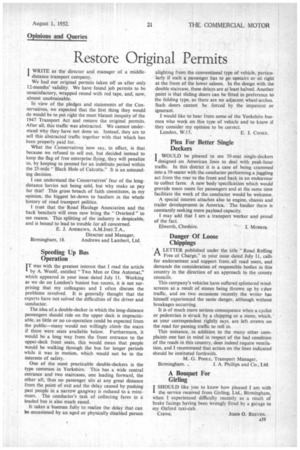Opinions and Queries
Page 51

If you've noticed an error in this article please click here to report it so we can fix it.
Restore Original Permits
I WRITE as the director and manager of a middle' distance transport company.
We had our original permits taken off us after only 12-months' validity. We have found job permits to be unsatisfactory, wrapped round with red tape, and, now, almost unobtainable.
In view of the pledges and statements of the Conservatives, we expected that the first thing they would do would be to put right the most blatant inequity of the 1947 Transport 'Act and restore the original permits. After all, this traffic was abstracted. We cannot understand why they have not done so. Instead, they are to sell this abstracted traffic together with that which has been properly paid for. .
What the Conservatives now say, -in effect, is that because we refused to sell out, but decided instead to keep the flag of free enterprise flying, they will penalize us, by keeping us penned for an indefinite period within the 25-mile "Black Hole of Calcutta." It is in astounding decision.
I can understand the Conservatives' fear of the longdistance lorries not being sold, but why make us pay for this? This gross breach of faith constitutes, in my opinion, the biggest let-down to hauliers in the whole history of road transport politics. I trust that the Road Haulage Association and the back benchers will even now bring the " Overlord " to see reason. This splitting of the industry is despicable, and is bound to lead to trouble for all concerned.
E. J. ANDREWS, A.M.INST.T.A., Director and Manager,
Birmingham, 18. Andrews and Lambert, Ltd.
Speeding Up Bus Operation
IT was with the greatest interest that I read the article by A. Woolf, entitled "Two Men or One Automat," which appeared in your issue dated July 11. Working as we do on London's busiest bus routes, it is not surprising that my colleagues and I often discuss the problems involved. It is generally thought that the experts have not solved the difficulties of the driver and conductor.
The idea of a double-decker in which the long-distance passengers should ride on the upper deck is impracticable, as little or no co-operation could be expected from the public—many would not willingly climb the stairs if there were seats available below. Furthermore, it would be a long way from the front entrance to the upper-deck front seats, this would mean that people would be walking through the bus for longer periods while it was in motion, which would not be in the interests of safety. One of the most practicable double-deckers is the type common in Yorkshire. This has a wide central entrance and two staircases, one leading forward, the other aft, thus no passenger sits at any great distance from the point of exit and the delay caused by pushing past people in a narrow gangway is reduced to a minimum. The conductor's task of collecting fares in a loaded bus is also much eased.
It takes a busman fully to realize the delay that can be occasioned by an aged or physically disabled person alighting from the conventional type of vehicle, particularly if such a passenger has to go upstairs or sit right at the front of the lower saloon. In the design with the double staircase, these delays are at least halved. Another point is that sliding doors can be fitted in preference to the folding type, as there are no adjacent wheel-arches. Such doors cannot be forced by the impatient or ignorant. I would like to hear from some of the Yorkshire busmen who work on this type of vehicle and to know if they consider my opinion to be correct. London, W.13. E. J. COOKE.
Plea For Better Single Deckers
I WOULD be pleased to see 50-seat single-deckers designed on American lines to deal with peak-hour traffic. In this district it is a case of being crammed into a 39-seater with the conductor performing a juggling act from the rear to the front and back in an endeavour to collect fares. A new body'specification which would provide more room for passengers and at the same time facilitate the work of the conductor would be welcome. A special interest attaches also to engine, chassis and trailer developments in America. The haulier there is constantly seeking more payload capacity.
I may add that I am a transport worker and proud of the fact.
Elworth, Cheshire, I. MORRIS.
Danger Of Loose Chippings
A LETTER published under the title "Road Rolling
Free of Charge," in your issue dated July II, calls for endorsement and support from. all road users, and demands the consideration of responsible bodies in this country in the direction of an approach to the county councils.
This company's vehicles have suffered splintered windscreens as a result of stones being thrown up by ether traffic, and on two occasions recently the writer has himself experienced the same danger, although without breakages occurring. It is of much more serious consequence when a cyclist or pedestrian is struck by a chipping or a stone, which,' as your correspondent rightly says. are left strewn on the road for passing traffic to roll in.
This nuisance, in addition to the many other complaints one has in mind in respect of the bad condition of the roads in this country, does indeed require ventilation, and I recommend that action on the lines indicated should be instituted forthwith.
M. G. POOLE, Transport Manager, Birmingham. , J. A. Phillips and Co., Ltd,
A Bouquet For Girling
SHOULD like you to know how pleased I am with 1. the service received from Girfing, Ltd., Birmingham, when I experienced difficulty recently as a result of brake facings having been wrongly fitted by a garage to my Oxford taxi-cab. Crewe. JOHN 0. REEVES.




















































































